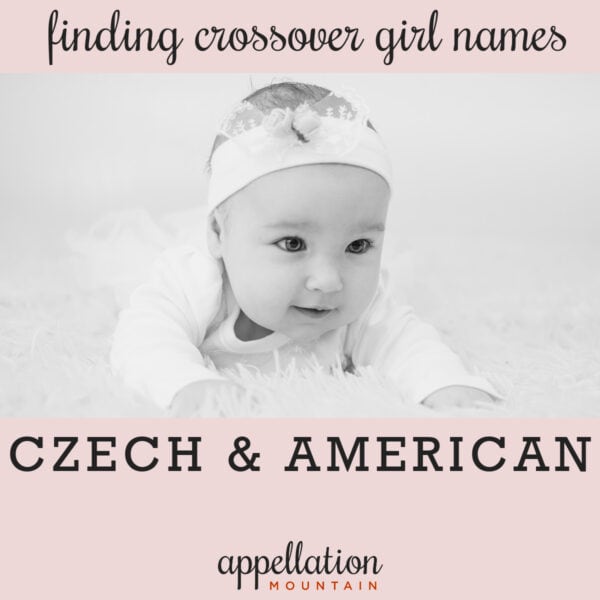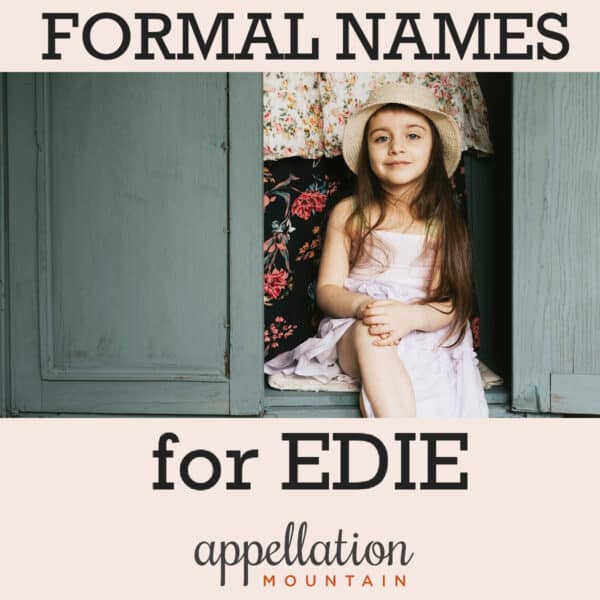She’s another obscure saint’s name, and an impeccable Welsh heritage choice. If you’re looking for something less obvious than Gwendolen, here’s one to consider.
Thanks to Charlotte for suggesting Eluned as our Baby Name of the Day.
Let’s tackle the pronunciation first: is it el u NED or EL in ed? Forvo’s pronunciation sounds more like el EE ned. Say that in American English, and it might be interpreted as Ellie Ned. Attractive alternative spelling Eiluned muddies the waters further, suggesting ay lu NED. Variant Elined might help – or not. As with many an import, this is only an option for parents willing to pronounce, correct, explain, and pronounce again. And again.
But if you can clear that hurdle, this is an intriguing option. Eluned was sister to Endellion, one of King Brychan’s two dozen kids, most of who carried on dad’s work of converting others to Christianity. Eluned earned her halo for rejecting the advances of a pagan prince. He pursued her, and it ended in her death – but where she fell, a spring arose. (Okay, where her severed head fell, the spring arose. You might tell your daughter the first version.)
Most sources agree that her name is derived from the Welsh word eilun, for image. She’s been exported in an astonishing number of forms:
- In the collection of Welsh myth known as the Mabinogion, Luned is a handmaiden to the Lady of the Lake. Luned has been interpreted as the celestial Lunette;
- Alfred, Lord Tennyson’s Idylls of the King retold the stories of King Arthur for a nineteenth century audience. In his work, the knight Gareth falls in love with the difficult Lynette. Tennyson didn’t reinterpret her name himself – he was borrowing from Sir Thomas Mallory’s 15th century Le Morte d’Arthur. It was Mallory who converted Luned to Lynette;
- Some suggest she’s also the source of Enid, which could easily be a contracted form of the longer name. Enid also appears in Tennyson’s Idylls. But Enid is probably a separate Welsh name, derived from their word for purity.
Eluned has never appeared in the US Top 1000. While she’s rare on my native shores, two notable Welsh women have answered to the name:
- Born aboard the ship Myfanwy en route to Patagonia, writer Eluned Morgan was known for her early twentieth century accounts of life in the Welsh settlement;
- Also known for her writing, Eluned Phillips won the bardic crown at the National Eisteddfod of Wales twice – the only woman to do so. Her triumphs were relatively recent – 1967 and 1983 – but aren’t quite enough to make Eluned familiar outside of Wales.
I can’t tell if she’d fallen out of use in Wales for generations, or if she’s simply always been sparingly bestowed.
An American girl could answer to Ella or Ellie as a short form, keeping Eluned right side of wearable. (There’s also Luna, depending on the pronunciation you prefer.)
Imports with little history of use in English can be tricky, but Eluned might strike the right balance. Her El- links to Elizabeth and a host of other familiar choices, but her overall sound is distinctive. File her with other obscure saints’ names like Everild – if you don’t mind explaining, she can be a lovely option.





I really love the myth of Gareth and Lynette and there’s a Linet in my family tree, so I really love the idea of Eluned. I keep mispronouncing it El-oon-ed, so I’d probably stick to the Elined spelling for the more simplified pronunciation. One hesitation I have with Eluned is that she’ll inevitably be called Ellie. Not that there is anything wrong with Ellie, other than it’s popularity as a nickname, so I’d probably keep it to the middle. Now if I could just find a reason to justify a Welsh name…
Ooh, a Linet on the family tree – that’s an intriguing one. Is she recent enough to know the origin of her name?
It’s just a guess, because that particular set of great-great grandparents were quite a creative baby namers… He was a botanist so it might be after Carl Linnaeus (
I like Eluned! I’ve always thought el-in – ned, but think el – ee – ned is much prettier. I like that she’s uncommon-ish and reminds me of luna: moon. I think Eluned would fly well here in the land of “all things Irish are cool” since I’m really getting tired of Liam & Conor, Fiona & Maeve (even though I like them, enough already folks)! I’m ready to start hearing fresh Celtic type names and Eluned fits the bill for me! How cute would this Ellie be in full? 🙂
This could be a great substitute for Elinor, Eliana, Ella, etc. I think of clair de lune when I see Eluned!
Ffion is a great Welsh girl’s name. Though the double f might throw some people off.
Ffion looks awesome, but I have to ask: how *does* she get pronounced? Part of my Yankee brain wants to say “finn” and the other part just goes “hmmm”. Double consonants give Us Yanks fits! It would be neat to see Ffion in the parks of Boston!
FEE-on.
At first glance, I would pronounce Eluned with only two syllables: eh-LOOND, sorta rhymes with marooned. Other than it’s scarcity and unfamiliarity, this name really isn’t all that different from Elinor. If Americans can learn how to pronounce Sean, they might surprise you.
its not it’s
Nameberry states that the pronunciation is el-LOOND. I wonder where they got their information from. To me, that pronunciation is not intuitive at all, but Welsh is a completely foreign language, so I’m basically read to believe whatever anyone tells me about the language’s pronunciation rules.
Interesting – part of the issue appears to be regional:
https://www.cs.cf.ac.uk/fun/welsh/Lesson01.html indicates: A matter of discussion; in the south, it is completely equivalent to “i” (long or short), even in diphthongs; in the north, it’s halfway between the vowels in “lick” and “look” (short) or “leap” and “loop” (long) with the lips not rounded but slack. The sound also seems to have a similar sound to the Russian yeri, but not centered so far back in the throat. Examples: “sut” (short) and “thus” (long).
And even more intriguing: All of the vowel sounds in Welsh are pure vowels. One of the most difficult things for English speakers to overcome in pronouncing Welsh is the tendency in English to “diphthongize” vowels. For example, if you listen to yourself very closely when you pronounce the word “toe” (long o sound), you will find yourself putting an “oo” sound at the end. The trick is to clip the sound off before you get to the “oo” part. The same thing problem occurs with long a as in “bay”: it tends toward having an “ee” at the end.
I should add that I took that second paragraph straight from the Welsh lesson site, too! I’m learning a lot about vowels, but I didn’t know any of that about Welsh until I read the lessons.
Interesting. I think I might tend to “clip” my vowels a bit more than most native English speakers, at least the North American ones. I’ve had people comment on how I pronounce sorry with a pure o. However, some of those vowels sound confusing; I’m turning to my memory of Gavin and Stacey to try to get a better grip on it!
The Welsh vowels – so they say – are straight/pure vowels. But I have not found that to be true at all. There are regional dialects that shift things, and there *are* diphthongs, no matter what the books say. My native Welsh speaker friend from mid-Wales can even have a tough time with certain other dialects and sometimes the same word -say for purple- is different in north and south Wales. It’s crazy because this country is tiny!
Eluned = el-EE-ned. Basically, Appellation Mountain has got it down.
What’s also odd is that there is no k or j in Welsh, yet every third person here has the last name of Jones. It’s a traditional Welsh last name. My native Welsh landlords named Jones have no idea where it comes from! Language is fun.
I’ve been listening to an English recording of the novel that introduced me to Eluned, and the reader basically pronounces the name phonetically: “el-OO-ned”.
Hi. I’ve been lurking for awhile now. I’m an American living in Wales, pregnant too. I keep getting suggestions to name my child something Welsh. Well…. maybe if we were planning on staying in Wales for the rest of our lives that might work. Welsh, contrary to popular belief, is relatively easy to pronounce once you know how the letters sound (u = ee, for example), but moving in an English speaking world and family makes a Welsh name fall under many of the points you listed in your previous post. I do have a soft spot in my heart for Awen (pronounced more or less the same in English and in Welsh, and meaning divine poetic inspiration.
Congrats, Ewigweibliche! Cross-cultural naming is tough. My kids have a new cousin in Poland named Jan, nicknamed Jas – and I’m not quite able to make Jas roll off my tongue, even though I *know* I’m saying it as best I can.
Maybe a Welsh name in the middle and more of a portable name in the first spot?